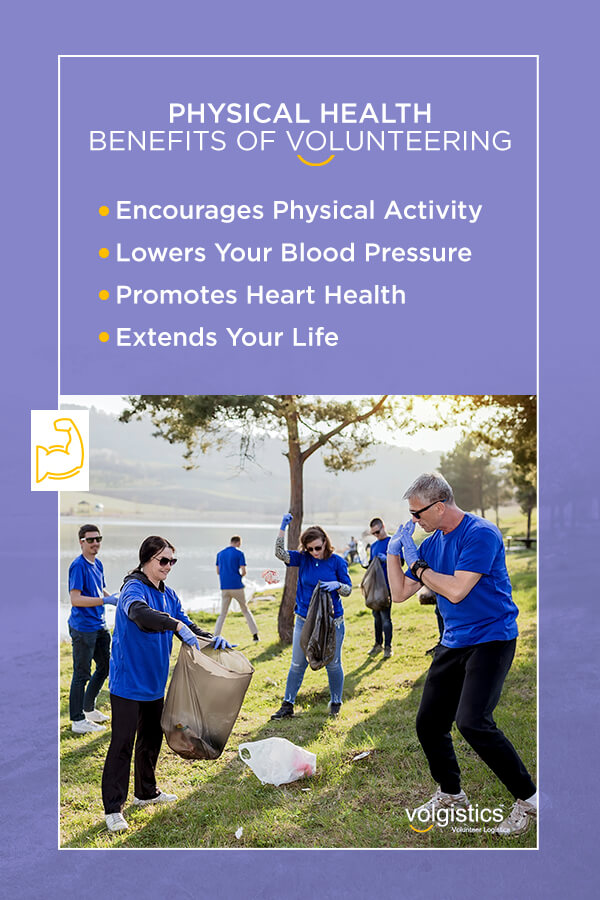Many think of volunteering as a way to help others — and while that’s true, it’s also a great way to improve your own mental and physical health. Volunteering is good for your health in a number of ways, including its ability to reduce stress levels, encourage life-long learning, and lower blood pressure.
When it comes to volunteering, you get out what you put in. To take advantage of all the health benefits of volunteering, you’ll need to find fulfilling work that you care about and can fully commit to. In this guide, we’ll discuss how volunteering boosts your health and how you can reap the benefits of volunteering for yourself.
Mental and Emotional Benefits of Volunteering
Volunteering is good for your mental health because it allows you to meet new people, stay active and reduce stress— all of which are key to maintaining your mental and emotional well-being. Some of the most significant mental health benefits of volunteering include the following:
1. Volunteering Benefits Your Relationships with Others
Above all, volunteering is about making connections with people. Whether you’re connecting with the people you’re volunteering for, your fellow volunteers, or the volunteer organizers, building a strong connection is essential to being a successful volunteer. When you volunteer your time, you can feel more socially connected and less lonely.
Being a volunteer also allows you to meet like-minded people. When you volunteer at an animal shelter, you get to spend time with people who love animals too. When you volunteer your time at a performing arts center, you get to meet fellow volunteers who share your passion for the arts.
These connections can be extremely valuable for older citizens — especially for the 28% who live alone since it tends to get harder for people to make new connections as they age. Social isolation and loneliness are linked to several health issues, including heart disease, high blood pressure,depression, and anxiety. Volunteering is an excellent way for the older population to meet new people with similar interests.

2. Allows You to Contribute to a Cause
Actively supporting a cause that’s important to you is a fantastic way to feel connected to something bigger than yourself. While donating money to a non-profit organization is a great way to get involved, giving your time is even more valuable. Volunteering lets you physically support something you care about and meet people who share your values.
If you care about making sure people in your community don’t go hungry, consider volunteering at a food bank. The more you care about your volunteer work and the causes it supports, the more likely you are to stick with it and give 100% of your effort, which will result in more health benefits.
3. Volunteer Work Brings You Out of the House
One of the simplest benefits you get from volunteering is a great excuse to get out of the house. Most volunteer work involves going to a specific location and performing certain duties. If you have trouble motivating yourself to go outside and see the world, volunteering is a great way to give yourself the push you need. Plus, committing to being a volunteer makes you accountable to someone, making it more likely that you’ll follow through with your goals.
Even if you’re not volunteering to run an exercise class or lead a hiking trip, volunteering usually involves some type of physical activity. From handing out flyers to washing dogs, volunteering is bound to get your heart rate up, which can provide a boost to your health, mood, and overall mental health.
4. Volunteerism Benefits The Health of Your Community
Volunteer work often centers around community betterment, so becoming an active volunteer is a great way to strengthen your bond with your community. When you volunteer, you can strengthen your network within the community with those you meet, work with, and help.
Having a strong connection with your community can also help you improve your health. For example, when you’re in touch with your community, you’re more likely to know where to get the freshest organic produce or where flu shots are available. Plus, being a part of a community can give you a sense of social connection and belonging, which can stave off stress and feelings of loneliness.
5. Benefits Your Mental Health
Volunteering reduces stress and depression because it encourages you to move more, connect with your community, and help those in need. One study by the Corporation for National and Community Service found that those who regularly volunteer have lower rates of depression, especially older volunteers. Volunteer work can also reduce stress, which is strongly linked to health outcomes. Another study found that volunteering can help reduce feelings of depression in chronic pain patients.
In addition to the feelings of fulfillment that come with volunteering, donating your time to a worthy cause can also improve your self-confidence, encourage physical activity, and facilitate connections with people in your community, all of which help fight depression.

6. Improves Self-Confidence
A large part of volunteering is talking with others and effectively expressing yourself. The more you talk, the more you learn to advocate, which leads to higher levels of self-confidence. Whether you’re canvassing on the street or organizing a group activity, you need to be confident — otherwise, you won’t be effective in your job. When you have multiple opportunities to exercise your confidence, eventually, it will come naturally.
For example, if you’re not a confident public speaker, working as a volunteer can help build your confidence. You may need to address a group of students during after-school tutoring or talk to a group of fellow volunteers, both of which can help boost your self-confidence.
7. Boosts Happiness and Benefits Quality Of Life
What you gain from volunteering isn’t always tangible. Many find that volunteering is a great way to boost overall happiness. What makes an individual happy varies depending on the person and the volunteer activity. If being around animals and making sure they’re safe and healthy makes you happy, volunteering at an animal shelter may bring you joy. If you enjoy feeling like you’re making a difference in the world, canvassing for a social justice or environmental non-profit can make you feel happy and like you’re contributing to the cause.
8. Encourages Learning
Volunteer work often includes some element of learning. Whether you’re tutoring kids in math after school or learning how to care for shelter animals, most volunteering involves the giving or receiving of skills and information. When you take the time to learn new skills and pass them along to others, you keep your mind sharp by enhancing your memory and thinking abilities, which is an especially important benefit for older volunteers.
As you age, it becomes more and more crucial to find stimulating activities that keep you thinking and learning — and volunteering is a great way to do that while supporting an important cause.

What are The Physical Benefits of Volunteer Work?
If volunteering has the potential to boost your mental and emotional health, it’s bound to also benefit your physical health. So, how does volunteering improve your physical health? Here are some of the top health benefits of volunteering:
1. Encourages Physical Activity
Most types of volunteer work require some kind of physical activity, which brings a host of benefits with it. You may need to hand out flyers on a street corner, organize a dance class at an assisted living facility, or give a tour at a local museum, all of which require you to be up and moving.
While different types of volunteer work will require varying levels of physical activity, most will require at least some physical movement, which is beneficial to your health. One study found that volunteers have comparable health tonon-volunteers who are five years younger, meaning volunteer work could literally add years to your life.
Even those with chronic health conditions and disabilities can participate in volunteer work. Plus, one study found that chronic pain patients who volunteer tend to report less pain.
2. Lowers Your Blood Pressure
If you want to learn why volunteering is good for your health, you don’t need to look much further than its effect on your blood pressure. One study found that adults over 50 who volunteer at least 200 hours per year are 40% less likely to have high blood pressure, which can often lead to stroke, heart failure, and premature death.
Since volunteering encourages you to be more active and meet new people, the volunteering health benefits for seniors go beyond low blood pressure.
3. Promotes Heart Health
Volunteering is linked to reduced stress, increased physical activity, and lower blood pressure, so it comes as no surprise that the heart would be positively affected as well. One study focusing on adolescents found those who spent one hour a week volunteering with elementary school children in an after-school program had lower levels of cholesterol and inflammation, plus lower body mass indexes (BMIs), meaning they had healthier hearts and less body fat.
4. Extends Your Life
Can volunteers live longer with the many mental and physical health benefits they gain? The short answer is probably. There’s no definitive proof that volunteering can mean the difference between a longer life and a shorter one, but all the benefits that come with volunteering — such as human connections, physical activity, reduced stress, and lower blood pressure — contribute to a healthier and longer life.
Additionally, one study found that volunteering is linked to better health behaviors. For example, it found that volunteers were 47% more likely to receive cholesterol tests, 30% more likely to get flu shots, and 53% more likely to receive mammograms or x-rays. The fact that volunteers are more likely to make positive health decisions contributes to the theory that volunteering can help extend your life.
There hasn’t been enough research on the long-term health benefits of volunteering to know for sure what they are, but it’s safe to say that volunteering will likely have a positive effect on your life.
How to Get Volunteering Health Benefits
How much do you need to volunteer to start reaping the health benefits? And what type of volunteer activity is best? Unfortunately, no one really knows. Some experts think that volunteering to read or tutor might be the most beneficial for improving your memory and thinking skills, while more physical volunteer activities could contribute to better cardiovascular health. However, there is no conclusive evidence to support this theory yet.
There’s also no evidence that a certain amount of time volunteering each week or year will result in certain health benefits. The participants in one study saw their heart health improve from volunteering one hour per week, while the participants in another volunteered for 200 hours over the course of 12 months and had lower blood pressure.
Each volunteer will likely see different results depending on a number of factors, including their current health condition, personality, chosen volunteer activity, volunteer hours and more. An important factor many volunteers don’t consider is motive. One study found that, although those who volunteer frequently and regularly have a lower mortality risk, those who volunteer for the wrong reasons — like those who volunteer to make themselves feel better instead of to make others feel better — have a mortality rate similar to that of non-volunteers.

Help Your Volunteers Reap the Benefits of Volunteering With Volgistics
It turns out that volunteering can make you healthier. Volunteering is good for your mind, body, and soul — but if you’ve ever worked as a volunteer manager or program director, you know organizing and coordinating volunteers can be a challenging task. You need to oversee volunteer recruitment and communication, create volunteer schedules, record volunteer service, customize and print reports, and so much more.
With Volgistics, you can perform all these duties and then some. Volgistics is an easy-to-use, scalable volunteer management platform that sets the standard in the industry. Plus, there’s no startup fees or contract, and you get free unlimited email support. We’ve worked with organizations across all types of industries, from hospice and palliative care facilities to libraries and zoos.
There are several different types of physical and mental health benefits available to volunteers — but if you’re unable to manage your volunteers effectively, they may not be able to acquire the health benefits they deserve. If you’re looking to streamline your volunteer management and help your volunteers reap the benefits of volunteering, reach out to Volgistics today.

